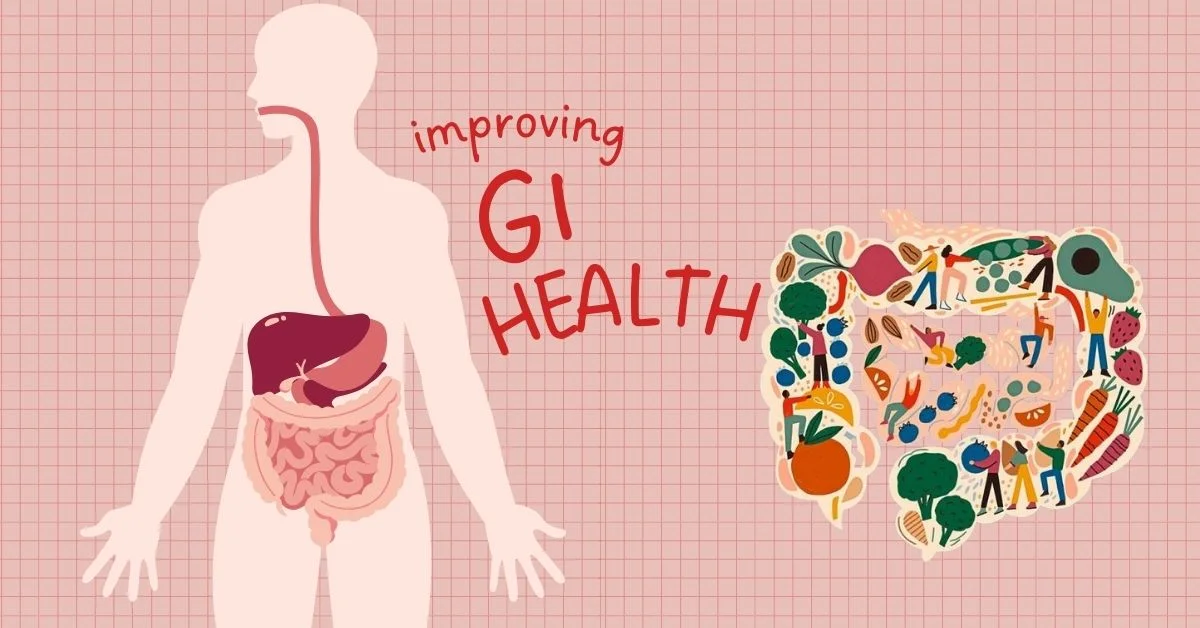Improving GI health: Simple Steps for a Healthier Digestive System
Maintaining good gastrointestinal (GI) health is essential for overall well-being. A healthy gut not only ensures proper digestion and absorption of nutrients but also plays a crucial role in supporting the immune system and even influencing mood and mental health. In this article, we’ll explore some effective ways to improve GI health and enjoy the benefits of a happier digestive system.
Nourish Your Gut: The Importance of a Balanced Diet for Digestive Health
A well-rounded diet lays the groundwork for optimal gut health. By prioritizing nutrient-rich foods, you can support digestive function, maintain bowel regularity, and foster a diverse ecosystem of beneficial gut bacteria. In this section, we’ll delve into the significance of a balanced diet and explore key food groups that promote gastrointestinal well-being.
The Role of Fiber
Fibre serves as the cornerstone of a healthy digestive system. It adds bulk to stool, facilitating smooth bowel movements and preventing constipation. Moreover, certain types of fibre, known as prebiotics, act as fuel for probiotic bacteria in the gut, promoting their growth and proliferation. By including ample fibre in your diet, sourced from whole grains, fruits, vegetables, legumes, nuts, and seeds, you can nourish your gut microbiota and support overall digestive health.
Embrace fruits and vegetables
Fruits and vegetables are nutritional powerhouses packed with vitamins, minerals, antioxidants, and fibre. These plant-based foods not only provide essential nutrients for overall health but also contribute to a flourishing gut microbiome. Aim to incorporate a rainbow of colours into your meals, as different fruits and vegetables offer unique nutrients and phytochemicals that support diverse microbial communities in the gut.
Lean Proteins
Protein is an essential macronutrient necessary for tissue repair, immune function, and enzyme production. Opt for lean sources of protein, such as poultry, fish, tofu, tempeh, legumes, and low-fat dairy products. These protein-rich foods provide amino acids that support digestive enzyme production and help maintain muscle mass, which is crucial for proper gastrointestinal function.
Healthy Fats
Including healthy fats in your diet is vital for absorbing fat-soluble vitamins, supporting cell membrane integrity, and reducing inflammation. Incorporate sources of unsaturated fats, such as avocados, nuts, seeds, olive oil, and fatty fish like salmon and mackerel. These foods provide omega-3 fatty acids and other beneficial compounds that promote heart health and contribute to a well-balanced diet conducive to optimal gut function.
Stay Hydrated
Adequate hydration is key to maintaining a healthy digestive system. Water helps to soften stool, making it easier to pass, and aids in the digestion and absorption of nutrients. Aim to drink plenty of fluids throughout the day, including water, herbal teas, and hydrating foods like fruits and vegetables.
Limit processed foods and added sugars
Highly processed foods and added sugars can disrupt the balance of bacteria in the gut and contribute to inflammation and digestive discomfort. Try to minimize your intake of processed snacks, sugary beverages, and refined carbohydrates, and opt for whole, nutrient-dense foods instead.
Incorporate fermented foods
Fermented foods are rich in probiotics, which are beneficial bacteria that promote a healthy gut microbiome. Adding fermented foods like yoghurt, kefir, sauerkraut, kimchi, and kombucha to your diet can help support digestive health and boost immunity. Start slowly if you’re not accustomed to these foods to allow your body time to adjust.
Manage Stress
Stress can have a significant impact on gut health, as the brain and the gut are closely connected via the gut-brain axis. Chronic stress can disrupt digestion, exacerbate the symptoms of gastrointestinal disorders, and alter the composition of gut bacteria. Incorporate stress-reducing practices into your daily routine, such as mindfulness meditation, deep breathing exercises, yoga, or spending time in nature.
Get regular exercise
Regular physical activity not only benefits overall health but also promotes healthy digestion. Exercise helps to stimulate bowel movements, reduce bloating and gas, and improve intestinal motility. Aim for at least 30 minutes of moderate exercise most days of the week, whether it’s walking, cycling, swimming, or engaging in your favourite sports or fitness activities.
Prioritize Sleep
Quality sleep is essential for gut health and overall well-being. Poor sleep habits can disrupt the balance of gut bacteria, increase inflammation, and contribute to digestive issues. Aim for 7-9 hours of restful sleep each night and establish a relaxing bedtime routine to promote better sleep quality.
Conclusion
Taking steps to improve GI health can have far-reaching benefits for your overall health and well-being. By adopting a balanced diet, staying hydrated, incorporating fermented foods, managing stress, exercising regularly, and prioritizing sleep, you can support a happier digestive system and enjoy improved vitality. Start implementing these simple strategies today to nurture your gut and reap the rewards of better health for years to come.







